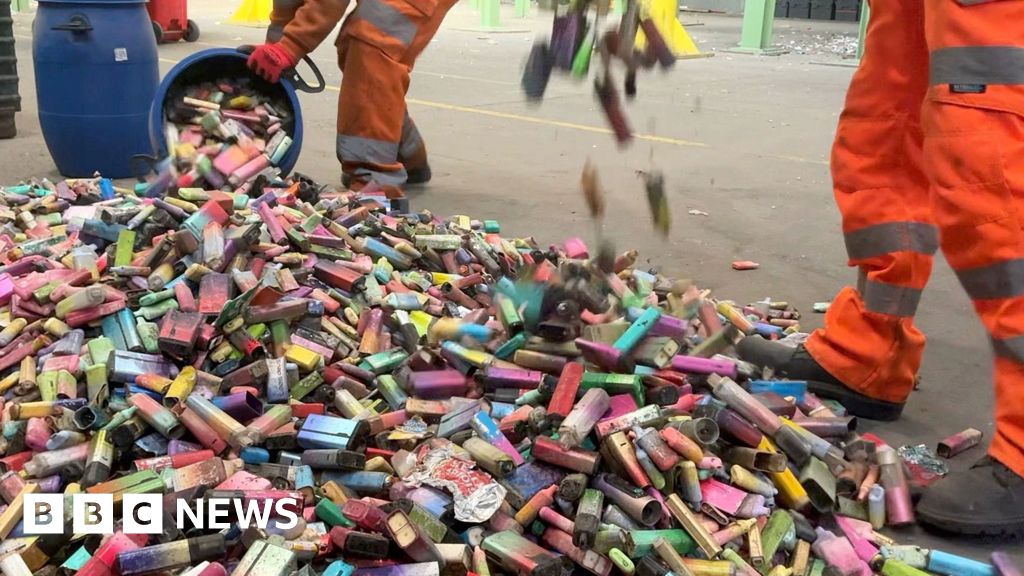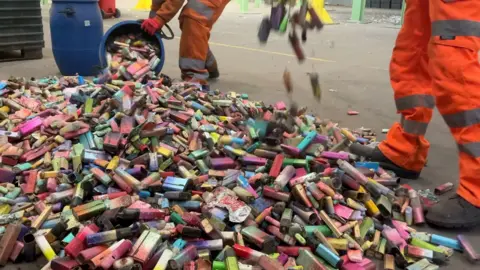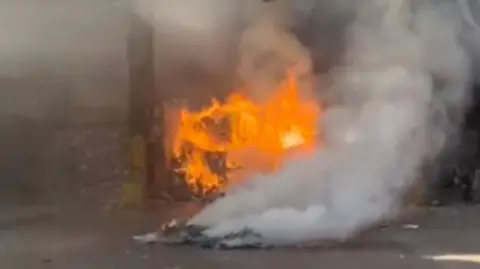Business
Vape ban isn’t working, says waste firm boss

Ben KingBusiness reporter
 Biffa
BiffaThe ban on disposable vapes is failing to stop millions being thrown away incorrectly, and the devices are still causing chaos for the waste industry, a boss at a leading firm has said.
“We’re seeing more vapes in our system, causing more problems, more fires than ever before,” said Roger Wright, the strategy and packaging manager at Biffa.
Vape firms have launched cheap reusable devices, so instead of refilling and recycling them, people were binning them and buying more, he said.
A spokesperson for the vape industry said the June ban had been a success, and any rise in devices being thrown away was likely due to black market trade.
In April and May, the last two months before the ban, Biffa’s recycling facilities in Suffolk, Teesside and London saw around 200,000 vapes on average incorrectly mixed in with general recycling.
For the three months since the ban in June, the average figure has been 3% higher.
Biffa handles almost a fifth of the UK’s waste, and Mr Wright reckons the rest of the industry will be seeing a similar picture, suggesting around a million vapes a month going into general recycling.
This may partly be because large stocks of disposables were sold off cheap before the ban came into force.
But the vape industry’s response to the ban has also contributed, says Mr Wright.
Big vape firms launched a range of reusable models that are very similar to the most popular disposable vapes and sold at similar prices.
By adding a replaceable nicotine pod and a USB recharging port, they can be sold as reusable, but Mr Wright suspects many are still being thrown away.
“We still see a lot of these reusables in the bins, because people have used them as a disposable item,” he says.
The ban has also led to a big increase in the number of different kinds of vapes on the market, as firms launched dozens of new products to try to get round the ban.
“The innovation’s gone crazy to try and get around the ban. Ironically it makes our job of recycling them – if we collect them – much harder,” said Mr Wright.
But Marcus Saxton, chairman of the Independent British Vape Trade Association, argued that the ban has been a success.
“We can see through the data consumers are refilling and recharging devices,” he said.
“So actually, if Biffa’s findings are true, this is about disposable products washing through the system, either through illegal traders or through the illegal black market.”
 Biffa
BiffaVapes contain lithium batteries, which can catch fire when crushed. This often happens in bin lorries or recycling centres – one of the reasons they were banned in June.
They are called “bombs in bins” because of the fires they cause. Vapes should be returned to stores or recycling centres for specialist handling, not added to general recycling or general waste.
In June alone, Biffa had to deal with 60 fires caused by vapes and other small electrical items. Once the fire has occurred, it’s hard to pinpoint the exact cause.
Biffa said dealing with this problem costs the UK waste industry a billion pounds a year.
The ban on disposable vapes was partly designed to curb the many millions of devices that were incorrectly thrown away.
Vapes mixed in with general waste, which is often ultimately incinerated, cause less serious problems than those in general recycling.
Mr Wright said collecting vapes and electrical devices directly from people’s homes alongside general waste and recycling would be part of the solution.
“I think that would massively improve the collection rates,” he said. “You’re more likely to put it out on the kerbside than you are to bother to go down to your corner shop and give it back.” Some councils already do this.
A government spokesperson said: “Single-use vapes get kids hooked on nicotine and blight our high streets – it’s why we’ve taken tough action and banned them.”
It said it has made in compulsory for retailers to provide recycling bins, and its circular economy strategy due later this year aims to increase the reuse and recycling of electrical equipment.
Business
Investors suffer a big blow, Bitcoin price suddenly drops – SUCH TV

After the drop in gold price, Bitcoin price also fell.
Bitcoin fell below $77,000 in the global market, Bitcoin price fell by more than 13% in a week.
Bitcoin’s highest price in 6 months fell below $126,000, Bitcoin price has dropped by more than $49,000.
Business
Post-Budget Session: Bulls Push Sensex Up By Over 900 Points, Nifty Reclaims 25,000

Last Updated:
The BSE Sensex is trading higher by 371 points, or 0.47%, at 81,090.24, while the NSE Nifty rises by 70 points to trade above 24,850 at 24,889.25.

Stock Market Today.
Market Updates Today: A day after the market crash following the Budget’s provision to hike Securities Transaction Tax (STT), the domestic equity market on Monday saw heightened volatility. After opening nearly flat, the NSE Nifty rose to the day’s high, then touched the day’s low before sharply recovering to trade at the day’s high of 25,093.
As of 3:16 pm, the BSE Sensex surged by 932 points, or up 1.13%, to 81,641.87 in the afternoon trade and the NSE Nifty rose by 267 points, or up 1.07%, to trade above 25,000 at 25,093.27. After opening nearly flat, the NSE Nifty rose to the day’s high, then touched the day’s low before sharply recovering to trade at the day’s high of 25,093.27.
Among the 30 Sensex shares, 25 stocks were trading in the green. Among the top gainers were PowerGrid, Adani Ports, BEL, Reliance, Mahindra & Mahindra, Larsen & Toubro, and IndiGo, rising by up to 7.91%. The laggards were Axis Bank, Infosys, Titan, TCS, and Trent, falling by up to 1.97%.
After opening nearly flat, at around 9:30 am, the BSE Sensex jumped by 350 points to 81,112.03 in the opening trade, while the NSE Nifty rose 91 points to trade above the 24,900 level at 24,910.85. However, the benchmarks gave up all gains and declined to day’s low amid heavy volatility.
Aakash Shah, technical research analyst at Choice Equity Broking Private Ltd, said, “Near-term sentiment remains cautious despite some support from domestic technical indicators. The broader market direction will largely be influenced by global equity cues, crude oil price movements, and institutional fund flows.”
On Sunday, the Nifty saw an aggressive sell-off after the Budget 2026 announcement to hike STT, plunging nearly 870 points from 25,440 to an intraday low of 24,571, before staging a partial recovery to close at 24,825.
“A strong bearish candle was formed, with the index closing decisively below the 200-day EMA, indicating a deterioration in trend strength. Immediate resistance is placed at 24,950–25,000, while key support lies in the 24,650-24,700 zone. The RSI slipped to 31, reflecting oversold conditions, while India VIX surged 10.73% to 15.09, highlighting elevated market volatility,” Shah said.
On Sunday, February 1, foreign institutional investors (FIIs) sold equities worth Rs 588 crore, while domestic institutional investors (DIIs) also remained net sellers, offloading shares worth Rs 682 crore, adding to the pressure on the market.
V K Vijayakumar, chief investment strategist at Geojit Investments Ltd, said, “Yesterday’s market selloff resulting in 495 point crash in Nifty was a knee-jerk reaction to the sharp increase in STT on F&O trades. This was not a revenue-raising measure, but a decision to discourage retail traders from complex F&O trading, in which 92% of them were losing money. This decision is in the interest of retail investors. But this decision impacted the market sentiments, which were already impacted by the decision to make no changes in the LTCGs tax, which a section of the market was expecting rather unrealistically.”
It is important to understand that the Budget is a growth-oriented Budget with fiscal prudence. The 10% nominal GDP growth projected in the Budget is achievable and has the potential to deliver around 15% earnings growth in FY27. The market will soon start discounting this positive. But it is possible that FIIs may continue to sell impacting the market. Retail investors should keep their cool and remain invested and continue to invest systematically. A significant upturn in the market may take time; perhaps a retreat from AI trade globally. We don’t know when this will happen. But we know that an earnings rebound is imminent in response to this growth oriented Budget. That is a clear positive, he added.
February 02, 2026, 09:34 IST
Read More
Business
Gold and silver sell-off gathers steam in correction after record highs

Gold and silver prices have continued to drop sharply in a “brutal” sell-off after hitting record highs in recent weeks.
The precious metals began falling on Friday in response to US President Donald Trump’s nomination for the incoming chairman of the Federal Reserve.
His choice for former Fed governor Kevin Warsh to replace current chairman Jerome Powell when his term ends in May soothed some investor nerves, which boosted the US dollar but saw appetite for safe-haven investments gold and silver slump in response.
Gold and silver suffered their worst trading days for decades on Friday and were down heavily again on Monday, with spot prices off by another 7% and 11% respectively at one stage.
Silver had plunged by nearly 30% on Friday and gold dropped over 9% in its worst one-day drop since 1983.
Gold and silver had been enjoying a record breaking rally as investors sought refuge amid global geopolitical uncertainty, conflict and tariff woes.
Ipek Ozkardeskaya, senior analyst at Swissquote, said: “The sell-off has been far more brutal than I, and many, expected.”
He added: “For silver, the rally on the way up was faster than gold’s, so the correction on the way down is faster too.”
Kathleen Brooks, research director at XTB, added: “If the sell off continues, then gold and silver are at risk of eroding their losses for the year so far.
“The historic move lower in silver prices has not stemmed a fall at the start of this week.
“Traders have not yet found a level that they are happy to buy the dips, and the timing of Chinese Lunar New Year in mid-February could accelerate the sell off, as Chinese traders reduce risk ahead of the holiday.”
UK and US stock markets are expected to open in the red on Monday, as the gold and silver rout has a knock on effect on mining giants, while Brent oil was also 5% lower.
Derren Nathan, head of equity research at Hargreaves Lansdown, said: “Mining stocks are likely to feel the heat as metal prices scramble to find a floor.
“Oil prices are also trending the wrong way for investors in commodity-focused companies.”
-

 Sports6 days ago
Sports6 days agoPSL 11: Local players’ category renewals unveiled ahead of auction
-

 Entertainment6 days ago
Entertainment6 days agoClaire Danes reveals how she reacted to pregnancy at 44
-

 Tech1 week ago
Tech1 week agoICE Asks Companies About ‘Ad Tech and Big Data’ Tools It Could Use in Investigations
-

 Business6 days ago
Business6 days agoBanking services disrupted as bank employees go on nationwide strike demanding five-day work week
-

 Sports6 days ago
Sports6 days agoCollege football’s top 100 games of the 2025 season
-

 Fashion1 week ago
Fashion1 week agoSpain’s apparel imports up 7.10% in Jan-Oct as sourcing realigns
-

 Politics1 week ago
Politics1 week agoFresh protests after man shot dead in Minneapolis operation
-

 Politics6 days ago
Politics6 days agoTrump vows to ‘de-escalate’ after Minneapolis shootings






